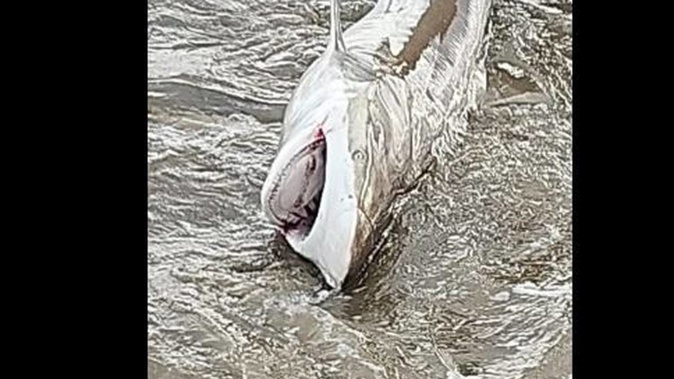
A large shark caught in a fishing net has washed up on Narrowneck Beach just days after a juvenile hammerhead washed up in the same spot.
The shark, identified by the Department of Conservation (DoC) as a bronze whaler, washed up on shore at the beach near Devonport on Auckland’s North Shore at around 7am this morning.
The owner of the net was able to free the shark and pushed it back into the water according to reports from locals.
Photos of the shark tangled in net were posted on a local Facebook page with many calling for nets to be banned off the popular swimming beach.
The bronze whaler was caught in a fishing net before it was washed up on shore at Narrowneck Beach near Devonport. Photo / Devonport Locals FB page
Clinton Duffy, Marine Technical Advisor at DoC said the shark was an adult male bronze whaler (Carcharhinus brachyurus) and its Māori names include reremai, tōiki or ngengero.
“It is very common in Waitematā Harbour and the wider Hauraki Gulf at this time of the year and interactions with fishers, including set-netters are not uncommon,” he said.
“Bronze whalers are not a protected species, and therefore DoC would not launch a response.”
The bronze whaler was freed from the net but it is not known if it survived. Photo / Devonport Locals FB page
The hammerhead shark that washed up on the same beach five days earlier was a juvenile smooth hammerhead shark which is also common in the warmer waters of the top half of the North Island.
Duffy said the hammerhead was not a protected species so its death would not be investigated.
There has been an increased number of shark sightings in the warm shallow waters at popular swimming beaches in the past month.
Just last week Jeff Ah Koy was heading to Otama Beach in the Coromandel when he noticed a family running out of the water in a panic.
He quickly launched his drone and captured amazing footage of a shark swimming around just off the sandy beach.
/cloudfront-ap-southeast-2.images.arcpublishing.com/nzme/X77KLJCTWNEJ3BKDNJK6LAHLHI.jpg)
Jeff Ah Koy used his drone to film a shark swimming at Otama Beach on the Coromandel Peninsula on January 12. Picture supplied still from video credit / Jeff Ah Koy
Ah Koy was able to show the family the footage.
“They were really surprised and quite amazed the shark had come right into the shallow part,” Ah Koy said at the time.
Ah Koy said he was still able to enjoy a swim at the beach with his drone footage showing the shark around 100m away from where he decided to take a dip.
In early December a woman was bitten by a shark when wading in a Riverton estuary in the early hours of the morning.
The 21-year-old suffered a significant leg wound in the late-night shark attack near the Riverton rugby grounds.
The shark was understood to be a sevengill shark.
New Zealand Marine Studies Centre educator Rob Lewis said that in southern New Zealand, sevengill sharks often moved closer to shore in the summer.
They were “very curious animals” and fast movements and splashing could trigger them to investigate.
“Of course, their way of investigating is by biting things,” Lewis said.
Take your Radio, Podcasts and Music with you

/cloudfront-ap-southeast-2.images.arcpublishing.com/nzme/SQSEXF3IQJDZ3LEQO3JMA63WR4.JPG)
/cloudfront-ap-southeast-2.images.arcpublishing.com/nzme/5D4ELYDQOVGAJGCK5S6JHUONTA.JPG)








